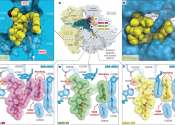Synthesis of a new compound with excellent intrinsic magnetic properties using smaller amounts of rare earth elements
The National Institute for Materials Science has successfully synthesized a new SmFe-based magnetic compound, SmFe8.8N1.1, which possesses superior intrinsic magnetic properties when compared to those of NdFeB compound used ...









